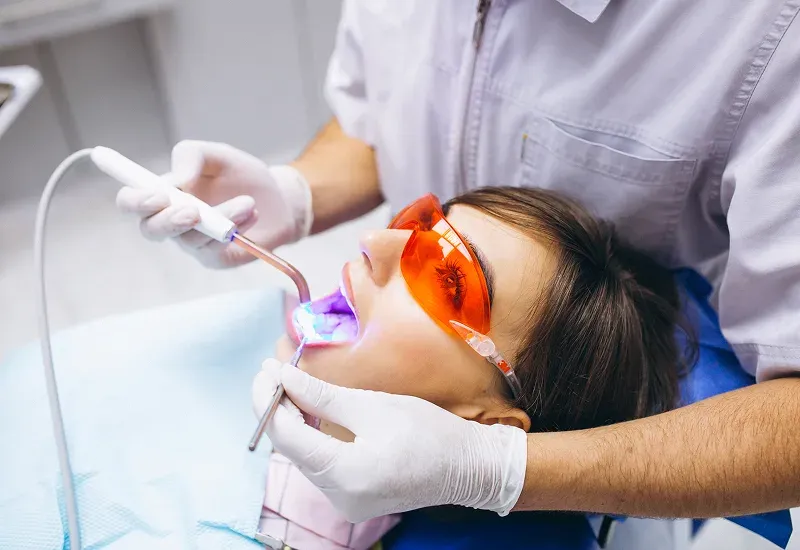Why Choose a Laser Dentist for Dental Implant Surgery?
by Dr. Thomas Scarfe
15 April 2025

Understanding Laser Dental Treatments
Dental implant surgery is a big step toward restoring your smile, but what if I told you that your dental procedure will be faster, smoother, and almost completely pain-free? All thanks to laser dentistry, which is a modern alternative to traditional scalpels. It is revolutionizing the way laser dentists place implants into a patient's mouth. Laser dental treatment is turning the ideal world of precise and minimally invasive procedures into a reality. If you are anticipating implant surgery but are scared of traditional techniques, laser dental surgery can be the answer to your concerns. Let me walk you through the process of laser dentistry and why you should consider it.

In simple words, laser dentistry is an upgrade from conventional tools to a high-tech, precision instrument. Instead of traditional drills and scalpels, laser dental treatments use focused light energy to target specific areas of your mouth with outstanding accuracy. It is faster, more efficient, and causes less damage to the surrounding tissues. Lasers can accomplish almost anything in dentistry, from cavity fillings to gum reshaping. Dentists have been using lasers in professional teeth whitening for a while, but now they have been relying on them for oral surgery. They have become so common that many dentists are swapping their old tools for these futuristic devices.
Benefits of Laser Dentistry in Comparison to Traditional Dentistry
In regular dental implant surgery, the scalpel-and-stitch method is like drawing with a thick marker. The thick tip results in less precise, messier, and harder to control strokes. That is why traditional methods lead to more bleeding, swelling, and a longer healing period. Now, if you compare this to laser dental surgery, it is like using a fine-tipped pen. That sharp tip is not only designed for precision but also for zero disruption in the adjacent areas.
Lasers work by emitting highly concentrated light energy, which interacts with tissues in different ways depending on the wavelength used. For dental implants, the laser dentist will make precise incisions in the gum tissue, allowing access to the jawbone without the need for a scalpel. Some lasers can also modify bone by vaporizing small layers, helping to create an optimal surface for implant placement. Throughout the process, a laser's heat coagulates blood vessels, which reduces bleeding while also sterilizing the area to lower the risk of infection. The laser does not require physical contact with the tissue, minimizing mechanical trauma and leading to a more controlled surgical process.

Types of Lasers Used in Dental Implant Surgery
Every laser is different and has a different purpose in dental implant surgery. Erbium lasers are like precision sculptors, used to cut through bone and gum tissue with minimal damage. They are ideal for prepping implant sites and reshaping bone. On the other hand, diode lasers specialize in soft tissue work. They are perfect for reducing bacteria, promoting healing, and contouring gums around implants. Both offer a less invasive, more comfortable experience for your dental implants to settle in with minimal pain and maximum precision.
What Does the Future Look Like for Laser Dentistry?
The tools we use shape our experiences (and this is true in the case of dentistry as well). We have moved from landlines to smartphones, from paper maps to GPS, then why limit ourselves to scalpels and drills in dental surgery? The future of dentistry is not about fixing teeth alone. There has been a shift towards redefining experiences. Laser dentistry is just a step closer to a world where dental procedures are the smartest. I am talking AI-driven diagnostics catching problems before they start, 3D-printed implants customized in real-time, and flawless mechanical precision. The question is not when the change is coming — it is whether you are prepared for it.
Why Prefer a Laser Dentist for Dental Implant Surgery?
Not every dentist may use lasers, but the ones who do belong to an entirely different league. They have mastered the art of creating perfect smiles without relying on pointy tools. If you could choose between old-school surgery and a high-tech approach that minimizes pain, swelling, and recovery time, why wouldn't you? Here's how laser dentists are revolutionizing implant surgery:
Lasers are 'Hacks' for Healing
No excessive bleeding, no long downtime — if that does not sound like a cheat code to a radiant smile, I don't know what will. Think of it as a skip button for pain and swelling. Unlike traditional methods, lasers promise fewer sutures, less post-surgery inflammation, and a significantly faster healing process. You will bounce back to your routine within a few days of getting your new implants.
More Wins, Less Slips
Conventional tools have become precise over time, but lasers still surpass them in this department. They allow a dentist to use their skill to create pixel-perfect results. Since lasers target only the necessary tissue, they preserve more of the healthy surrounding areas. It leads to better implant stability and a more predictable outcome. This level of precision reduces the risk of complications and guarantees that the implant placement is as smooth and seamless as possible.
No Dental Anxiety
At some point, almost everyone has feared visiting dental clinics due to terrifying drills and loud clunky tools. Another great thing about lasers is their quiet, vibration-free nature, which eliminates dental anxiety for a lot of clients. Besides, because lasers cause less trauma to tissues, many procedures require little to no anesthesia.
But Wait! Here is What You Must Know
Laser dental treatments sound like a dream, but there are a few things to consider before you run to book an appointment. While lasers offer game-changing benefits, not every dentist is equipped to use them, and the cost might be higher than traditional methods.

Patients who receive laser treatment during implant surgery experience enhanced healing of the surgical site. Incorporating laser technology can help your gums recover more quickly and support the implant more effectively.
—Journal of Oral Implantology
Laser Dentistry Requires Special Skill
Lasers are not just fancy gadgets. They require skill, training, and precision. A dentist using lasers needs specialized education and experience to ensure the technology is used correctly and safely. So, how do you find the right laser dentist? While conducting your research, look for a dentist certified in laser dentistry, ideally with training from a recognized institution.
Check their experience and how long they have been using lasers, read reviews, ask for before-and-after photos, and don't hesitate to ask about their success rate with implant surgeries using lasers.
Lasers are Expensive, But Look at the Long-term
Laser implant surgery can sometimes come with a higher price tag upfront, but it won't look so bad if you consider the bigger picture. Traditional surgeries often lead to longer recovery times, potential complications, and additional costs for corrective procedures. Lasers reduce these risks, so you'll be less likely to spend extra money fixing issues down the road. Sometimes, paying a little more now means avoiding a lot of hassle (and expense) later.
Final Word
Laser dentistry is not just a trend that will fade out with time. The benefits of laser dentistry have proved themselves to be a game changer for almost every dental procedure. By reducing bacteria, sealing blood vessels instantly, and stimulating tissue regeneration, lasers help give your implants the best possible foundation. So, if you are investing in a new smile, why not choose the method that works smarter, not harder?
Contact your dentist today in Santa Rosa, Dr. Thomas Scarfe, at Creative dentistry of Santa Rosa, to learn more about why choose a Laser Dentist for Dental Implant Surgery.
Resource:
Share This:
Disclaimer
*This media/content or any other on this website does not prescribe, recommend, or prevent any treatment or procedure. Therefore, we highly recommend that you get the advice of a qualified dentist or other medical practitioners regarding your specific dental condition. *
 CARING HANDS
CARING HANDS YOUR SMILE
YOUR SMILE OUR PRIORITY
OUR PRIORITY GENTLE DENTISTRY
GENTLE DENTISTRY CARING HANDS
CARING HANDS YOUR SMILE
YOUR SMILE OUR PRIORITY
OUR PRIORITY GENTLE DENTISTRY
GENTLE DENTISTRY CARING HANDS
CARING HANDS YOUR SMILE
YOUR SMILE OUR PRIORITY
OUR PRIORITY GENTLE DENTISTRY
GENTLE DENTISTRY CARING HANDS
CARING HANDS YOUR SMILE
YOUR SMILE OUR PRIORITY
OUR PRIORITY GENTLE DENTISTRY
GENTLE DENTISTRY CARING HANDS
CARING HANDS YOUR SMILE
YOUR SMILE OUR PRIORITY
OUR PRIORITY GENTLE DENTISTRY
GENTLE DENTISTRY CARING HANDS
CARING HANDS YOUR SMILE
YOUR SMILE OUR PRIORITY
OUR PRIORITY GENTLE DENTISTRY
GENTLE DENTISTRY CARING HANDS
CARING HANDS YOUR SMILE
YOUR SMILE OUR PRIORITY
OUR PRIORITY GENTLE DENTISTRY
GENTLE DENTISTRY CARING HANDS
CARING HANDS YOUR SMILE
YOUR SMILE OUR PRIORITY
OUR PRIORITY GENTLE DENTISTRY
GENTLE DENTISTRY CARING HANDS
CARING HANDS YOUR SMILE
YOUR SMILE OUR PRIORITY
OUR PRIORITY GENTLE DENTISTRY
GENTLE DENTISTRY CARING HANDS
CARING HANDS YOUR SMILE
YOUR SMILE OUR PRIORITY
OUR PRIORITY GENTLE DENTISTRY
GENTLE DENTISTRY CARING HANDS
CARING HANDS YOUR SMILE
YOUR SMILE OUR PRIORITY
OUR PRIORITY GENTLE DENTISTRY
GENTLE DENTISTRY CARING HANDS
CARING HANDS YOUR SMILE
YOUR SMILE OUR PRIORITY
OUR PRIORITY GENTLE DENTISTRY
GENTLE DENTISTRY CARING HANDS
CARING HANDS YOUR SMILE
YOUR SMILE OUR PRIORITY
OUR PRIORITY GENTLE DENTISTRY
GENTLE DENTISTRY CARING HANDS
CARING HANDS YOUR SMILE
YOUR SMILE OUR PRIORITY
OUR PRIORITY GENTLE DENTISTRY
GENTLE DENTISTRY CARING HANDS
CARING HANDS YOUR SMILE
YOUR SMILE OUR PRIORITY
OUR PRIORITY GENTLE DENTISTRY
GENTLE DENTISTRY CARING HANDS
CARING HANDS YOUR SMILE
YOUR SMILE OUR PRIORITY
OUR PRIORITY GENTLE DENTISTRY
GENTLE DENTISTRY CARING HANDS
CARING HANDS YOUR SMILE
YOUR SMILE OUR PRIORITY
OUR PRIORITY GENTLE DENTISTRY
GENTLE DENTISTRY CARING HANDS
CARING HANDS YOUR SMILE
YOUR SMILE OUR PRIORITY
OUR PRIORITY GENTLE DENTISTRY
GENTLE DENTISTRY CARING HANDS
CARING HANDS YOUR SMILE
YOUR SMILE OUR PRIORITY
OUR PRIORITY GENTLE DENTISTRY
GENTLE DENTISTRY CARING HANDS
CARING HANDS YOUR SMILE
YOUR SMILE OUR PRIORITY
OUR PRIORITY

